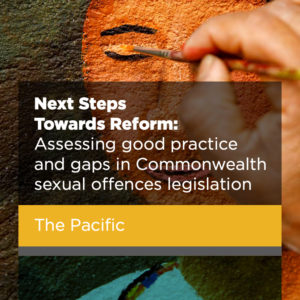All non-consensual sexual acts involving penetration are offences. Good practice sexual assault laws must be broadly defined and cover non-consensual sexual penetration of any orifice (mouth, vagina, anus) by any body part (not limited to a penis) or object.
Laws on rape and other penetrative sexual offences in many Commonwealth countries continue to define the crime as the penile penetration of a vagina. This is not good practice as it excludes rape of males and other ways in which non-consensual penetrative sexual conduct occurs, as well as same-sex penetrative sexual assaults. This approach also treats vaginal rape as more serious than other forms of penetrative sexual assaults, which does not reflect the harm caused to the victim/survivor.
Some jurisdictions criminalise rape as the non-consensual penile penetration of a vagina and cover other forms of non-consensual sexual penetration, including of males, as part of other sexual offences, such as indecent or sexual assault. These jurisdictions may satisfy this criterion if they criminalise all such conduct equally, including prescribing the same penalty. However, if these offences are not treated as seriously with appropriate penalties, they may not meet the good practice criteria. Better practice would be to make all crimes of penetrative sexual assault gender- neutral and object and orifice inclusive. Laws criminalising non-consensual anal sex as ‘buggery’ or ‘sodomy’ are not good practice either. These crimes should be repealed and anal rape of any person (male or female) should be covered under gender-neutral sexual assault provisions and child sexual offences.



